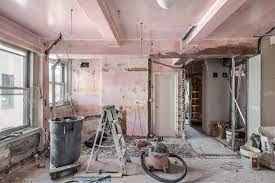 August 2022
August 2022
Noise. Smoking or other odours. Water leaks. Personal disagreements. Renovations. Always problematic, these and other issues became more troublesome during the pandemic when more people spent more time at home. Problems don’t disappear as the pandemic subsides.
Virtually every situation can be resolved faster and easier with better communication. Conflict among neighbors, between residents and management, or between tenants and the board should all be addressed swiftly and diplomatically to keep a community functioning and livable. The most common resident problems are odours, noise, water and renovations. Failure to communicate, controlled by management and the board, is common.
Odours –
 A relatively simple problem to resolve, odour problems become more complex if allowed to turn into a dispute between neighbours. Problems range from a dislike of hallway smells from a neighbor’s cooking to those from pets, smoking and cannabis. Hoarders create undesirable odours from their accumulation of stuff and lack of cleaning. A solution typically requires the offending neighbour to take measures preventing odours from escaping their unit or changing their activities.
A relatively simple problem to resolve, odour problems become more complex if allowed to turn into a dispute between neighbours. Problems range from a dislike of hallway smells from a neighbor’s cooking to those from pets, smoking and cannabis. Hoarders create undesirable odours from their accumulation of stuff and lack of cleaning. A solution typically requires the offending neighbour to take measures preventing odours from escaping their unit or changing their activities.
Odours entering a unit may travel through a building’s ventilation system in which case building management should be looking into why this is happening.
Noise –
 Noise is harder to address. Loud music or television, renovations, night partying, children and walking with shoes on hard floors are common complaints. Some are more sensitive to noise than others, or the problem may be when the noise is occurring. Acceptable noise during daytime hours differs from what is acceptable in the evening and throughout the night. Noise acceptable to some may be unacceptable to others.
Noise is harder to address. Loud music or television, renovations, night partying, children and walking with shoes on hard floors are common complaints. Some are more sensitive to noise than others, or the problem may be when the noise is occurring. Acceptable noise during daytime hours differs from what is acceptable in the evening and throughout the night. Noise acceptable to some may be unacceptable to others.
Many noise problems can be resolved by speaking with the individual having the problem, then to those causing the problem. Try to come up with a practical solution. Noise from a unit can be restricted by use of carpets. Many high-rise communities require that flooring include an underlayer of soundproof material.
Water Leaks –
 Damage, disruption and expense caused by water leaks cannot be understated. While some are unavoidable and hard to detect, many are due to resident negligence. A leaking toilet or dripping below a sink goes unaddressed. During renovations or when installing appliances requiring water, lower quality flexible tubing is used. Saving a few dollars today pales in comparison to the many thousands of dollars in damage caused to common areas and other units because of neglect.
Damage, disruption and expense caused by water leaks cannot be understated. While some are unavoidable and hard to detect, many are due to resident negligence. A leaking toilet or dripping below a sink goes unaddressed. During renovations or when installing appliances requiring water, lower quality flexible tubing is used. Saving a few dollars today pales in comparison to the many thousands of dollars in damage caused to common areas and other units because of neglect.
An annual plumbing audit to detect visible water leaks and risks is advisable to minimize avoidable water leaks and the damage they cause.
Renovations –
 Renovations are a constant source of concern. Noise or dust can enter other units. Common area renovations including façade work, hallway upgrades, repairs to a building’s mechanical systems, or loss of utilities are disruptive to residents. Failure to provide sufficient notice of in-suite or common area activities affecting other residents is a common complaint.
Renovations are a constant source of concern. Noise or dust can enter other units. Common area renovations including façade work, hallway upgrades, repairs to a building’s mechanical systems, or loss of utilities are disruptive to residents. Failure to provide sufficient notice of in-suite or common area activities affecting other residents is a common complaint.
Failure to Communicate –
 Some boards are secretive. They may not want their decisions second-guessed by everyone in the building. Others are simply disorganized or have no desire to be open and transparent. Any problem or resident concern is magnified by secrecy and lack of transparency.
Some boards are secretive. They may not want their decisions second-guessed by everyone in the building. Others are simply disorganized or have no desire to be open and transparent. Any problem or resident concern is magnified by secrecy and lack of transparency.
Resolving Problems
 All communities should have a clear set of rules and regulations that are not overly burdensome. This ensures that all residents understand what is expected of them so they can act in an appropriate manner, which reduces the number and extent of problems.
All communities should have a clear set of rules and regulations that are not overly burdensome. This ensures that all residents understand what is expected of them so they can act in an appropriate manner, which reduces the number and extent of problems.
Most problems occur when someone is unaware that a rule has been broken.
Infractions can occur when some believe others are receiving preferential treatment. Treating everyone equally, communication and rules enforcement are essential to a peaceful and enjoyable community.
When problems do occur, communication is the first step in addressing any dispute. All parties need to understand what the problem actually is. Both parties should understand the options available for resolving a problem, and what is expected from each of them. The best solution is one both parties are happy with after some level of compromise.
Newsletters and periodic meetings update owners on what is going on in their community, and address issues in a transparent way. These outreach efforts foster a sense of community and create an atmosphere where everyone works together to address issues in a rational and civilized manner. Effectiveness of this approach depends on the board and management being transparent by providing as much information as possible, keeping everyone informed of decisions being made and reasons for these decisions.
When to call the Lawyer
 Legal involvement is a last resort. When verbal and written communications fail to ensure rules are followed, or if someone’s safety or property is at risk, it’s time to reach out to the corporation’s lawyer. When a board member is confronted in the hallway by an angry resident, or the condominium manager is threatened, the easiest and safest solution is to inform that legal counsel is dealing with the matter. Legal counsel should then be informed of the situation.
Legal involvement is a last resort. When verbal and written communications fail to ensure rules are followed, or if someone’s safety or property is at risk, it’s time to reach out to the corporation’s lawyer. When a board member is confronted in the hallway by an angry resident, or the condominium manager is threatened, the easiest and safest solution is to inform that legal counsel is dealing with the matter. Legal counsel should then be informed of the situation.
Find Vendors in these Related Categories
- Accessibility Products
- Blinds, Shades & Balcony Flooring
- Condo Communications
- Condo Software - Management Software, Electronic Voting and more
- Contractors - Electrical
- Contractors - General
- Contractors - Mechanical
- Design Services
- Energy Services - Water
- Flooring
- Furniture
- Home Finishing
- Home Services & Automation
- Lighting Services & Suppliers
- Painting
- Pest Control
- Plumbing Services
- Renovation Services
- Restoration Services
- Sound Control
- Water Proofing & Systems
- Window Replacement/Repair







